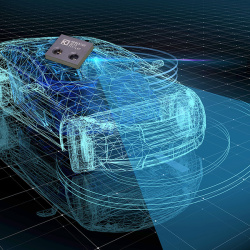Automotive Ethernet
Proposed IEEE Optical Multi-gigabit Automotive Standard Achieves Milestone
KDPOF Celebrates In-vehicle Network Standardization Progress Reaching IEEE 802.3 Working Group Ballot Stage
Madrid (Spain) April 8, 2022 – KDPOF, leading supplier for gigabit connectivity over fiber optics, congratulates the 802.3cz Task Force for the advance of the proposed IEEE 802.3cz standard to the IEEE 802.3 Working Group ballot stage. “We are happy that the IEEE 802.3 automotive optical multi-gigabit technically complete standard draft has entered the Working Group ballot stage,” stated Carlos Pardo, KDPOF CEO and active participant in the IEEE 802.3 working group. The 802.3cz standard draft for the automotive industry specifies speeds starting at 2.5 Gb/s and going up to 50 Gb/s. The 802.3 Task Force includes numerous individuals affiliated with key carmakers, such as PSA, Toyota, BMW, Ford, GM, and Volvo; Tier 1 suppliers; and components suppliers. These industry leaders have been working on an optical automotive multi-gigabit system that will fulfill the needs of future connected and automated vehicles. "We are very thankful and positive about the strong support from the industry,” added Pardo.
Getting Future-ready: EMC-safe and Robust Automotive Ethernet
The proposed IEEE 802.3 automotive optical multi-gigabit standard draft specifies 2.5GBASE-AU, 5GBASE-AU, 10GBASE-AU, 25GBASE-AU, and 50GBASE-AU using bend insensitive OM3 glass fiber. The OM3 class has been chosen because it is already extensively used in data centers with applications in more stressful applications like avionics. The draft standard optical specifications will allow the use of reliable light sources based on proven technology.
Cameras, displays, and sensors located throughout a vehicle typically connect to various electronic control units. These control units optimize operation of the vehicle power train, or provide the navigation and entertainment features included in vehicles, and have been included as test cases for standardization. The multi-gigabit capabilities the draft standard specifies will also be critical for the continued evolution of driver-assist and ultimately autonomous vehicle operation.
A specially dedicated Operations, Administration, and Maintenance (OAM) side channel will be available for dependability and link management. The draft standard also includes error correction capabilities to provide bit error rates better than 10-12, something critical but also challenging because of the harsh electromagnetic environment in automotive applications. The absence of retransmissions means controlled latency for video distribution.
The proposed multi-gigabit system wakes up in less than 100 ms. The ambient operating temperature of automotive environments, ranging from -40 ºC to up to 125 ºC (AEC-Q100 grade 1), is more challenging than traditional networking applications, as is meeting OEM reliability requirements (minimum of 15 years operation). Outstanding EMC compliance will also be fulfilled. The technology in development is based on advanced digital signal processing, using high-speed DAC and ADC to implement all needed algorithms such as equalization or pre-coding.
Automotive Standard to Supplement Industrial 10GBASE-SR
For industrial use, 10GBASE-SR is the current standard by IEEE to establish a communications channel in optical fiber at 10 Gb/s. With automotive requirements applied, the link budget offered by 10GBASE-SR is too low to be acceptable. Reasons include temperatures, life ranges, reliability, vibration, dust, aging, cost restrictions, harness routing, low power, and high production yield, among others. The technology approach of 10GBASE-SR is based on the technology of more than 15 years ago. Moreover, a prospective standard should be a scalable technology in order to enable even higher data rates such as 25, 50, and 100 Gb/s, as carmakers predict. It is time to develop a future-ready solution for OEMs using more advanced techniques that will make an impact by providing the lowest cost, most reliable, and highly scalable solution.
KDPOF will present an update on their optical in-vehicle network technology at VECS – Vehicle Electronics & Connected Services – International Trade Show from May 17 to 18, 2022 at stand H04:14 at Svenska Mässan in Göteborg, Sweden.
About KD
Fabless semiconductor supplier KD provides innovative high-speed optical networking solutions for harsh environments. Founded in 2010 in Madrid, Spain, KD offers its cost-effective technology as fully qualified automotive-grade ASSP, integrating electronics, photonics, and optics in a single IC. KD’s technology makes use of information theory, innovative digital adaptive algorithms, and analog mixed-signal design to maximize the receiver’s sensitivity. KD innovates in optical coupling and packaging design, which enables integration of optical communications ports in electronic control units using standard printed circuit assembly processes. Together, these offerings allow KD to support high-yield and reliable optoelectronics production in low-cost automotive-grade bulk CMOS deep submicron nodes, and to deliver products to carmakers with low risk, low cost, and short time-to-market. KD made gigabit communications for step-index plastic optical fiber (SI-POF) a reality for automotive and is now developing its multi-gigabit optimized solution for use with Glass Optical Fiber (GOF) as well.
Related News
- First Optical Automotive Ethernet Transmitter Test Demo Displays Proof of Concept for Multi-gigabit
- First Automotive Gigabit Ethernet Switch with Optical Ports
- TRUMPF and KDPOF Become Strategic Partners for Automotive Data Communications Solutions
- KDPOF Designs First Optical 1000BASE-RH SFP Module
- KDPOF Complements Renesas' New Vehicle Computer VC4
- Funzin Integrates KDPOF ICs in New Devices “FAIP 3.0” and “Photon”
- System Solution for Optical Communications in Vehicles
- New KD9351 FOT Reduces Cost for Gigabit Connectivity


